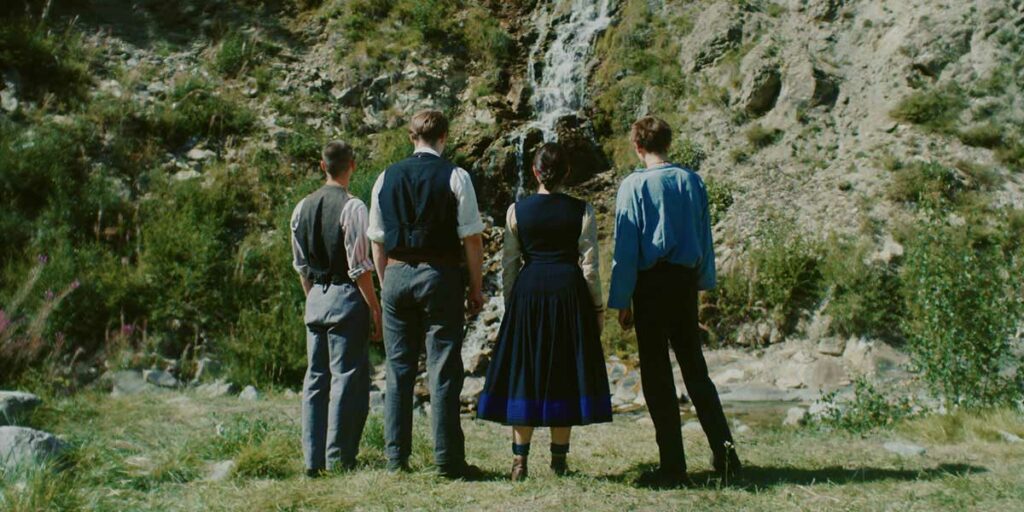Thunder premiered at TIFF, and we sat down for an interview with writer-director Carmen Jaquier and star Lilith Grasmug about the film and their experiences.
Thunder (Foudre) was written and directed by Carmen Jaquier and had its premiere at TIFF. The film takes place in a 1900s Swiss village, where 17-year-old Elisabeth (Lilith Grasmug) is summoned home after the mysterious death of her sister Innocente (Léa Gigon). When she reunites with boys from her childhood, she finds new desires awakened within her, which put her at odds with her devout faith and strict, oppressively overbearing mother (Sabine Timoteo). The film dives headfirst into heavy themes of sexual repression, religion, abuse, and the intersection and clash of faith and desire, leading to a highly uncomfortable yet effective journey through a teenage girl’s challenging coming of age.
So, naturally, I was grateful to be able to sit down with Carmen Jaquier and Lilith Grasmug for an illuminating interview and discussion on Thunder, its inspiration and influences, the experience of making it, and how it relates to many persistent issues going on even to this day.
The Inspiration and Making of Thunder
Clearly, Thunder deals heavily with sexual and religious oppression, with very provocative, extreme sequences and lines. What inspired this movie to begin with, and what spurred on such intense portrayals? Did you grow up in some religious environment that you could use to bring this story to life?
Carmen Jaquier: I think I’m always working with angriness. It’s really something I know. It comes from my childhood, my teenage-hood, and things pertaining to sexuality that I experimented with like a lot of girls and women, and even boys and men. Only, I experimented a bit later. But I didn’t write the film with my own experiences in mind: it’s just that things stay with you that you have to deal with all your life. And at one point, you’ll have this amazing opportunity to write a movie, to go through a story. Thunder is very personal, but it’s not precisely linked to my life.
Because this is a film dealing with themes like sexuality, repression, and religion, what are some of your favorite movies that deal with those themes, and did any of them influence you when you were crafting this one?
C.J.: Two movies were the bases for the shooting phase, but not for the writing. One was Pier Paolo Pasolini’s The Gospel According to St. Matthew, and the other was Carlos Reygadas’ Silent Light. These two movies were really important to us before shooting, for the lights and the positions and movements of the camera and with the actors. But otherwise, it’s also a lot of text, photos, personal experiences, and this connection between sensuality and faith.
There are scenes where Elisabeth is being abused by her parents. Did you, Lilith, have to go through any mental prep work like talking with your co-stars or getting to know each other before shooting so you could still feel comfortable? Or was it very simple and easy to go in and out of the scene?
Lilith Grasmug: It’s like practicing sports. We had a rehearsal for all these fight scenes. I got to know the actors who play my fictional parents, and they were very lovely to me, so everything was very clear. But those scenes were very exhausting. It was physical, and I have that memory of how it was really, really intense. Sabine, the mother, was close to crying sometimes at the end, because it was all too much to experiment with this violence and be a part of this violent parenting. It wasn’t easy.

What We Should Take Away From Thunder
It seems like Thunder was based in some sort of factual history with Switzerland. Do you know anything about that? And if so, do you know if all of those reasons to be angry are still as big a problem now? Or have they improved, or do you not fully know?
Carmen Jaquier: They’re based on a lot of research, but who’s writing history? Those who look at and record history can’t tell everyone’s story. So, I think it’s a mix between my research and what I realized when I met people who were kids in the time Thunder takes place in, or those who told us more about their feelings and memories. I think sometimes it’s dangerous to watch the movie and think, “Oh, times are so different today,” with all our technology and everything. Because if you really go deeper, I don’t know if our ways of dealing with oppressions, or judgements towards women or men or any kind of people who are not following the rules, are reallythat different today. Thinking that things are better is the real danger. Take women’s rights, for example. When you look at what’s happening in the States and what’s happened in a lot of countries, even in Switzerland, we’re always talking about the same things. You can make Thunder out to be a historical movie, but we should be really clear that we need to take these lessons for ourselves today.
In Thunder, we see both the main character and her sister go to such extremes in discovering their own desires, because I think they were held back so much that those urges just built up and exploded in a way that’s not as healthy as it could have been. Is that one of the takeaways that you wanted from the movie?
C.J.: I think different levels and interpretations are possible. But you have the first sister, Innocente, who had to go through really explorative but also dark sexual experiences. At one point, she knows herself in this sexuality, and she [takes drastic action] because of all the resulting judgement. And then there’s Elisabeth, who can learn about her sister, understanding a bit of her experimentation and where she had to go to deal with this. Then, with this experience, she can try to go to a different place, because her time with the three boys is with three friends, as a more positive experience. It’s really like first kisses, intimate talk, moments can say really deep, important things. So, she can grow up because of her sister, and we hope that her little sisters will also end up better.
This interview has been edited for length and clarity.
Thunder (Foudre) premiered at TIFF on September 10, 2022.

